Chalmers Johnson on America’s Forgotten War
The best-selling author of "The Sorrows of Empire" takes a look at David Halberstam's critical history of the Korean War.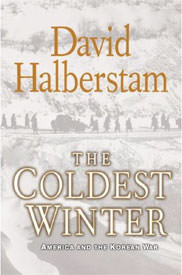
David Halberstam died prematurely at age 73 on April 27, 2007, in a car accident in California. He will be remembered as one of the greatest American journalists of the 20th century, in the same class as Seymour Hersh, who first rose to prominence in 1969 for exposing the My Lai massacre and its cover- up in Vietnam. Halberstam and Hersh were utterly different in Halberstam’s greater tolerance for establishmentarian thinking, but they will both figure prominently in histories of American imperialism yet to be written. Halberstam became world famous for two books detailing the folly of America’s military involvement in Vietnam during the 1960s. They are “The Making of a Quagmire” (1965) and “The Best and the Brightest” (1972), whose title refers ironically to the well-educated and well-connected professors, RAND Corp. pundits and military intellectuals who crafted American strategy in Vietnam during the Kennedy administration.
“The Coldest Winter: America and the Korean War,” Halberstam’s posthumously published magnum opus on the Korean War, is his 21st book — 15 of them best-sellers. It differs from his great Vietnam reporting in that Halberstam had no direct experience of the Korean War (he was 16 years old when it broke out in 1950). It is based on at least a decade of painstaking reading and research, including extensive interviews with people who did participate in the war. The result is exhaustingly long, often repetitive and not entirely comprehensive (he makes no mention, for example, of the aerial combat between U.S. F-86 Sabres and Soviet MiG-15s over the Yalu River, or of the controversy over China’s alleged brainwashing of U.S. POWs). But Halberstam’s book is powerful and often courageous on the cardinal issues of the time — the Chinese revolution and the failed American response to it, America’s transition from a near isolationist nation to the much hyped superpower of the Cold War, the bungling of megalomaniacs like General of the Army Douglas MacArthur, the constitutional crisis engendered by MacArthur’s insubordination to President Truman, and the damage done by the Red-baiting of Sen. Joseph McCarthy and his colleagues in Congress’ China Lobby and the press (e.g., Time magazine).
One aspect of Halberstam’s commitment as a historian and the consequent effect on his writing must be dealt with at the outset and then put aside. That is what he conceives of as his duty to present a populist portrayal of the ordinary soldier in day-to-day, sometimes hand-to-hand, combat and endless homilies on courage, fear, leadership, stamina, cowardice and any other emotions and qualities that might be encountered on the battlefield. I call this the Ken Burns-Tom Brokaw school of writing, hero worship, Great Generationism and military narcissism. Even in ordinary doses it is unimaginably tedious and boring. The amount of it in this 700-page book sometimes generated in me a deep regret that I had agreed to write this review. Here’s a representative sample:
“That was one of the great mysteries of combat, the process of going from green, scared soldiers to tough, grizzled, combat-ready (but still scared) veterans. Some men, a small percentage, never made it; they remained green, a burden to themselves and the men around them, in a permanent, hopeless incarnation as soldiers. They were incapable of or unwilling to break out of their civilian selves. Most men, however, whether they liked it or not, went through that transformation. They might regret it when they came home, and it might be a part of their lives they never wanted to revisit, but they did it. This had become their universe, and it was a small and brutal one, cut off from all the things they had been taught growing up. Most important of all, it was a universe without choice. No one entirely understood the odd process — perhaps the most primal on earth — that turned ordinary, peace-loving, law-abiding civilians into very good fighting men; or one of its great sub-mysteries — how quickly it could take place. One day troops were completely raw and casually disrespectful of whatever training they had received. In basic training, the machine gun bullets that whistled overhead were designed not to hit you. Then they found themselves on a battlefield in places like the Naktong [River]. …” Etc., etc., etc. for several more pages.
If you are into this type of writing, you will love this book. If you relish extremely detailed accounts of platoon and company-level combat and have the patience to try to disentangle the various levels of military command, you will find Halberstam’s long chapters on the disasters of the 10th Corps at the Chosin Reservoir and Gen. Matthew Ridgway’s stopping the Chinese advance in January 1951 at Chipyong-ni fully satisfying.
In my opinion, however, Halberstam’s enduring contributions are to the big geopolitical upheavals that the Korean War accentuated and punctuated. As he writes, “[T]he Korean War was never seen in isolation as just a small war in a small country; it was never just about Korea. It was always joined to something infinitely larger — China, a country inspiring the most bitter kind of domestic political debate.” Let me therefore consider three of the larger issues that Halberstam takes up in detail — MacArthur as general, the Chinese revolution, and Truman’s Lincolnesque firing of MacArthur.
On July 10, 1950, only a few weeks after June 25, when a 135,000-strong North Korean army had unexpectedly crossed the 38th parallel and routed the forces of America’s puppet, South Korea, Henry Luce’s Time put MacArthur on its cover. It was probably the worst month endured by the U.S. Army since the Civil War, but, as Halberstam notes, the Time piece “set a new standard for journalistic hagiography.” Time wrote, “Inside the Dai Ichi building [in Tokyo, headquarters of MacArthur’s Far East Command], … bleary-eyed staff officers looked up from stacks of paper [and] whispered proudly, ‘God, the man is great.’ General [Edward (Ned)] Almond, his chief of staff, said straight out, ‘He’s the greatest man alive.’ And reverent Air Force General George Stratemeyer put it as strongly as it could be put . … ‘He’s the greatest man in history.’ ” To find similar writing about a living person, one would have had to travel to Stalin’s Moscow, Kim Il Sung’s Pyongyang or Mao Zedong’s Beijing.
By the time of the Korean War, MacArthur had become a political force within the right wing of the Republican Party, and his cult of personality had made him virtually untouchable in Washington. He surrounded himself with sycophants and yes men, particularly in the realm of intelligence, where his G-2, Gen. Charles Willoughby, totally failed to assess accurately the threat that the Chinese might enter the war. Halberstam analyzes all of these issues in great detail. Perhaps the most interesting is MacArthur’s alleged masterstroke, the amphibious landing at Inchon harbor on the west coast of Korea.Halberstam is completely conventional on Inchon. It “was to be Douglas MacArthur’s last great success, and his alone. … He had fought for it almost alone against the doubts of the principal Navy planners and very much against the wishes of the Joint Chiefs. Inchon was Douglas MacArthur at his best: audacious, unpredictable, thinking outside the conventional mode, and of course, it would turn out, very lucky as well.”
I would emphasize the element of good luck over all others. MacArthur was fortunate at Inchon that Kim Il Sung was an incompetent military commander and had failed to garrison Wolmi-do Island, right in the middle of Inchon harbor. Had he done so, or had he mined the harbor and otherwise prepared to defend it, the American landing would have been a bloodbath. Surprise was also lacking. Japanese communist dock workers had warned the Chinese for weeks that huge preparations of ships and supplies were being made. The date of Sept. 15 was also inevitable. Inchon has no beaches, and only on that date would the morning high tide crest at 31.2 feet, high enough to permit landing craft access over the seawalls and piers. Adding to these risks, MacArthur had chosen as commander at Inchon Gen. Ned Almond, a sycophant who had never participated in, much less led, an amphibious assault and who was contemptuous of the warnings of Adm. James Doyle, responsible for most of the planning. The Joint Chiefs had pleaded with MacArthur to move the landing site south to Kunsan, where at least the bay was larger and there were beaches, but he refused even to consider it.
I have some personal knowledge of this terrain because in the months immediately following the Korean truce agreement of July 27, 1953, I was serving as the operations officer on a U.S. Navy amphibious vessel, the USS LST-883. We once landed at Kunsan, where the tides were also extraordinarily high, and after we had moored the ship all the water went out from under it and we settled into a flat, sticky mud field until the next high tide. MacArthur was indeed lucky at Inchon that none of the landing ships crashed into the seawalls and that they met little opposition.
This spectacular victory should have ended the Korean War. The North Korean troops retreated from South Korea in disarray. However, MacArthur then proceeded to ruin his own reputation, not to mention Truman’s presidency, by starting an entirely new war. Contrary to everything that the president and his military and civilian advisers stood for, MacArthur decided to unify Korea by force. He ordered his armies to advance north of the 38th parallel to the Yalu River, which is also the Chinese border. Even though Premier Zhou En-lai of the People’s Republic of China had warned the United States through the Indian ambassador to Beijing, K. M. Panikkar, that if this happened China would go to the aid of its North Korean allies, MacArthur welcomed a wider war as part of his crusade against communism. In an interview with Halberstam, Frank Gibney, who had been a combat correspondent during the Korean War, commented, “Inchon was the most expensive victory we ever won because it led to the complete deification of MacArthur and the terrible, terrible defeats that happened next.”
On the night of Nov. 25, 1950, having laid a carefully prepared trap, 250,000 to 300,000 Chinese troops struck. The South Korean troops broke and ran and the American units were decimated. Secretary of State Dean Acheson called the smashing of the U.S. Second Infantry Division “the greatest defeat suffered by the American military since the battle of Bull Run in the Civil War.” Halberstam compares the disaster to that of the French in 1940 and the British at Singapore in 1942. He echoes the judgment of history: “Of the American military miscalculations of the twentieth century, Douglas MacArthur’s decision to send his troops all the way to the Yalu stands alone.”
Halberstam’s treatment of the Chinese revolution leading up to China’s intervention is a tour de force — accurate, concise and important to understanding the course of the Korean War. He makes very few errors. He does not read Chinese and therefore does not recognize the difference between a Chinese given name and a family name. For example, on Page 515, Chinese commander Peng Dehuai’s aide should not be “Major Liquin,” which sounds like “Major Charlie,” but rather Major Han Liquin.
Halberstam goes into detail on China for one overarching reason: “Of the many professional sins of which Douglas MacArthur was guilty, … including hubris and vanity, none was greater than his complete underestimation of his enemy.” He did not even know who was the Chinese commander in Korea (he thought it was Lin Biao instead of Peng Dehuai). From 1945 to 1951, MacArthur never spent a night in Korea, always flying back to his bed, hot meal and wife in Tokyo. He was totally innocent of the Siberian temperatures that the troops he sent north had to endure as they got close to the Yalu, and he did not know that at 30 degrees below zero tank treads often freeze to the ground and engines refuse to start.
“The China that existed in MacArthur’s mind was one that had not been touched by revolution. He seemed not to care how and why Mao had come to power and seemed to have little interest in the forces the revolution had unleashed. … He had not been on the Asian mainland since 1905.” He thought that American artillery and airpower combined with atomic weapons made us invincible. MacArthur never learned anything about why he had been defeated. But Halberstam is very perceptive on the lessons that the Korean War should have taught subsequent American military planners, even though he is the first to acknowledge that virtually all of MacArthur’s errors were repeated in Vietnam.
Halberstam quotes one of his informants, Hal Moore, a rifle company commander, on why the Chinese defenses were so good. Their defensive positions were exceptional, “very tough to crack — they were hard-core, heavy duty, professional diggers. Their lines were built around deep caves, catacombs with large underground rooms sometimes twelve or fifteen miles behind the front lines. Because of that our artillery, bombers, and close air support had little or no effect on them.” An author with Halberstam’s experience is quick to recognize that another East Asian revolutionary army, that of North Vietnam, at first copied and then exceeded this aspect of Chinese military science, first in its 1954 assault on the French at Dien Bien Phu and then in its war against the Americans. MacArthur and his incompetent intelligence officers were even surprised that the Chinese wore white uniforms in winter so that they blended with the snow and that they moved only at night. American bombers laid waste to most of North Korea during the war but had no appreciable effect on its outcome.The so-called Chinese People’s Volunteers drove the American armies out of North Korea and back down the peninsula well below Seoul, the South Korean capital. MacArthur was still too sanctified for Washington to touch and he retained his command in Japan, but he had lost all control of the Korean front. On Dec. 13, 1950, the commander of the U.S. Eighth Army in Korea, Gen. Walton Walker, whom MacArthur had long treated as a mere hireling, was killed in a jeep accident. Truman and the Joint Chiefs immediately replaced him with Gen. Matthew Ridgway, whom they had all along preferred to MacArthur. A masterful and quick student of the Chinese style of warfare, Ridgway restored order and discipline to the American forces and gave them new tactics for fighting the Chinese. They ultimately stopped the Chinese advance in the middle of South Korea, and the Korean War settled into a war of attrition — so-called accordion warfare in which one side advanced and was repulsed, and the other side then repeated the same operation, except that Ridgway had learned how to impose much greater casualties on the Chinese than he himself suffered. The American public detested the war, but Ridgway had ensured that the United States was not going to be driven off the Korean peninsula.
Meanwhile, MacArthur brooded in Tokyo, still lionized by the Republican Party and the McCarthyites back home and by his personal military staff in Japan. He believed that the only way to reverse his declining fortunes was via a wider war with China or even a world war, one that he wanted to fight with atomic weapons and by “unleashing” the forces of Taiwan’s Chiang Kai-shek. MacArthur’s plan was to upstage his defeat at Chinese hands and Ridgway’s successful stalemating of the Chinese forces.
The political situation in the United States favored MacArthur. A combination of developments, including the Soviet testing of an atomic bomb, the fall of China to communism, the Alger Hiss case and Republican allegations that communists in the State Department had betrayed the Chinese Nationalists, and the Korean War itself, had fed growing demands that after 20 years in power the Democrats should relinquish the White House. “MacArthur now embarked on a course of his own, as openly disobedient as a commander in the field could be in dealing with civilian policies, while pushing solutions viewed by senior officials in Washington, London, and other allied capitals as catastrophic.”
Truman was fed up, even though he knew that he personally was much more unpopular than MacArthur. In his own mind, he began to compare MacArthur to the egotistical Civil War Gen. George McClellan, who believed that he was destined to become dictator of the United States and who, in November 1862, was sacked by President Lincoln. On April 11, 1951, Truman fired MacArthur, named Gen. Ridgway as his successor and gave Gen. James van Fleet command of the Eighth Army in Korea. Some of the president’s aides tried to get him to include in his statement that the Joint Chiefs of Staff and his most senior Cabinet members, especially Gen. George C. Marshall, unanimously agreed with him, but Truman cut them off. “This, he told them, was about elemental Constitutional processes, not about politics. … Tonight I am taking this decision on my own responsibility as President of the United States and I want no one to think I’m trying to share it with anyone else.”
Truman and his advisers had expected a serious political explosion, but it was much worse than any of them had imagined. Huge crowds turned out for MacArthur everywhere. It began in Tokyo, where, as he departed, some 250,000 Japanese, many of them weeping and waving small Japanese and American flags, lined the streets. Arthur Schlesinger and Richard Rovere wrote, “It is doubtful that there has ever been in this country so violent and spontaneous a discharge of political passion as that provoked by the president’s dismissal of the general.”
But it was short-lived. It soon became clear that the passions his return had triggered did not actually represent an endorsement of his policies, most especially of a wider war in Asia. The Senate’s Armed Services and Foreign Relations committees held hearings into his dismissal, which turned out to be a disaster for MacArthur. He told the senators that he had never said that the Chinese would not enter the war, but the administration countered with a stenographic record of the meeting between Truman and MacArthur at Wake Island on Oct. 15, 1950, at which MacArthur had said precisely that. Perhaps most devastating was the testimony of Marshall, the most prestigious American military officer alive at the time. As the former head of the Marshall Mission to China, he told Congress that Chiang Kai-shek’s forces on Taiwan were worthless and that instead of preventing them from recapturing their homeland, we were protecting them from being overrun in their island redoubt.
From 1951 to the present, President Truman’s reputation has continued to grow and MacArthur’s to diminish. Much to the fury of the right wing of the Republican Party, in 1952 the American people elected the much more internationalist Gen. Dwight Eisenhower president and turned their backs on MacArthur. In March 1953, Stalin died, opening the way for Sino-American negotiations on a Korean cease-fire. The last battle was fought in July 1953 at the notorious Pork Chop Hill (or Hill 255) right in the middle of the soon-to-be-proclaimed Demilitarized Zone. On the morning of July 11, Gen. Maxwell Taylor, the new commander of the Eighth Army, drove up to the headquarters of the Seventh Division and told its commander that Pork Chop Hill was not worth the investment of any more American lives, that the battle was over. The ensuing truce has held to the present day.
Halberstam’s account of the Korean War is pivotal to an understanding of the Cold War and its development in the years to come. His is a modern, unsentimental treatment that will stand the test of time. He combines fact and wisdom in a rare feat of historical synthesis and narrative. As he notes: “The larger question that arose from … the Korean War was soon ignored: whether or not America could separate serious and genuine national security concerns from the increasing power of simplistic anti-Communist rhetoric expressed in domestic political campaigns. … And that quandary, because of the vulnerability of the Democratic Party, helped lead America into Vietnam.” He might well have added other, more recent wars to the list.
Chalmers Johnson is author of the Blowback Trilogy — “Blowback” (2000), “The Sorrows of Empire” (2004) and “Nemesis: The Last Days of the American Republic” (2007).
Your support matters…Independent journalism is under threat and overshadowed by heavily funded mainstream media.
You can help level the playing field. Become a member.
Your tax-deductible contribution keeps us digging beneath the headlines to give you thought-provoking, investigative reporting and analysis that unearths what's really happening- without compromise.
Give today to support our courageous, independent journalists.

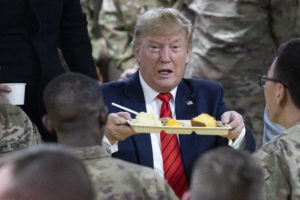
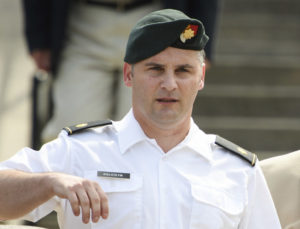
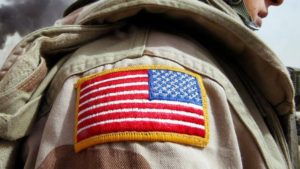
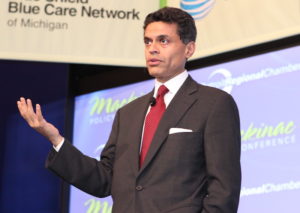
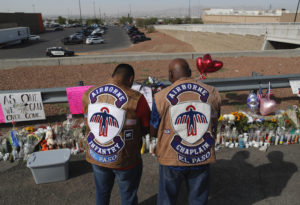
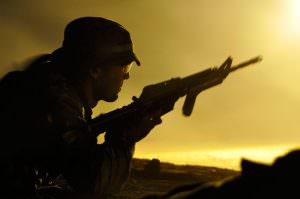
You need to be a supporter to comment.
There are currently no responses to this article.
Be the first to respond.